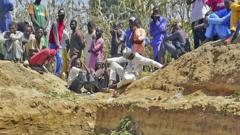The horrific disaster took place on Tuesday night in Jigawa, leaving a small community in deep shock. Mustapha Majiya, a 50-year-old farmer, mourns the loss of 50 relatives, including his teenage nephews, who died trying to prevent others from scooping fuel. The explosion, igniting after the tanker overturned, is one of the deadliest in recent Nigerian history, claiming at least 170 lives and leaving many more injured.
The disastrous event unfolded as desperate locals rushed to collect petrol amidst a fuel shortage crisis that has driven prices to soar in the oil-rich country. With many victims burned beyond recognition, the community faces the harsh reality of loss while also reflecting on the need for better safety measures regarding fuel transportation. Witnesses reported that the incident occurred shortly after the driver lost control of the tanker on a dark road, further compounding the tragedy.
Experts warn that such incidents could be prevented with more efficient safety protocols and alternatives for transporting petroleum products. As Mr. Majiya grieves, he recalls his nephews' recent investments in education, now tragically cut short. The community, mourning its losses, has called for government action amid frequent fuel tanker accidents, which result in thousands of deaths annually. The Vice-President has echoed the need for greater public safety awareness.
While the government considers its response to the disaster, it faces criticism for its past inaction on similar cases, raising pressing questions about trust and accountability. Activists and residents alike urge the need for broad systemic changes, including improved infrastructure and stringent safety inspections, as they navigate the devastation left by the explosion.
The disastrous event unfolded as desperate locals rushed to collect petrol amidst a fuel shortage crisis that has driven prices to soar in the oil-rich country. With many victims burned beyond recognition, the community faces the harsh reality of loss while also reflecting on the need for better safety measures regarding fuel transportation. Witnesses reported that the incident occurred shortly after the driver lost control of the tanker on a dark road, further compounding the tragedy.
Experts warn that such incidents could be prevented with more efficient safety protocols and alternatives for transporting petroleum products. As Mr. Majiya grieves, he recalls his nephews' recent investments in education, now tragically cut short. The community, mourning its losses, has called for government action amid frequent fuel tanker accidents, which result in thousands of deaths annually. The Vice-President has echoed the need for greater public safety awareness.
While the government considers its response to the disaster, it faces criticism for its past inaction on similar cases, raising pressing questions about trust and accountability. Activists and residents alike urge the need for broad systemic changes, including improved infrastructure and stringent safety inspections, as they navigate the devastation left by the explosion.





















